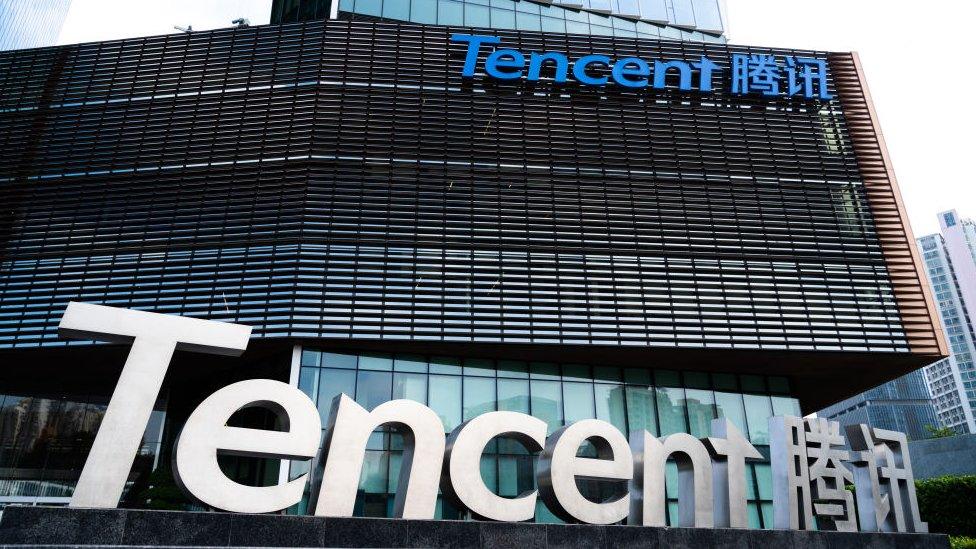Didi says removal of app in China will affect business
- Published

Didi is China's largest ride-hailing app
China's biggest ride-hailing company Didi Chuxing has warned there will be an adverse impact on its revenues after its app was removed from Chinese stores.
China's internet regulator ordered app stores to stop offering Didi's app on Sunday.
It says the firm illegally collected users' personal data.
It comes just days after the tech giant began selling shares on the New York Stock Exchange.
The removal does not affect existing users, but will prevent new users registering on the country's biggest ride hailing platform.
"The company will strive to rectify any problems, improve its risk prevention awareness and technological capabilities, protect users' privacy and data security, and continue to provide secure and convenient services to its users," Didi said in a statement, external.
That came after the Cyberspace Administration of China (CAC) said: "After checks and verification, the Didi Chuxing app was found to be in serious violation of regulations in its collection and use of personal information."
Two days earlier, the CAC announced it was investigating the firm to protect "national security and the public interest", prompting Didi's shares to drop by 5.3%.
Didi gathers vast amounts of real-time data every day. It uses some of the data for autonomous driving technologies and traffic analysis.
Last week, China's answer to Uber made its debut on the New York Stock Exchange and at the end of Friday's trading had a market valuation of almost $74.5bn (£53.9bn).
The company raised $4.4bn in the Initial Public Offering (IPO), in what was the biggest listing in the US by a Chinese company since Alibaba's debut in 2014.

Didi's troubles are just the start
By Karishma Vaswani, Asia Presenter
When I spoke to Didi Chuxing's founder Cheng Wei in 2018, the one thing that was apparent was that this was a man on a mission.
He wanted to take the Chinese firm global, and to offer a new vision of what a company driven by data could make possible.
"We were born in China," he told me at his offices in Beijing during an interview for the BBC series, Asia's Tech Titans.
"But we hope to be a global company. We hope to be able to solve traffic and transportation problems for the world."
The huge ambition Cheng Wei displayed to me on the rooftop of his sprawling Beijing campus manifested itself in Didi's much-anticipated US IPO last week.
But the environment in China today is very different from when I spoke to the Didi founder just a few years ago.
There's tighter scrutiny now both inside and outside of China on Chinese tech firms. And Didi's troubles come against the backdrop of a broader crackdown on Chinese tech by regulators in the country - a crackdown, that some analysts have said, could be politically motivated as Beijing attempts to impose more control on the dynamic sector.
What this means for both Didi and other Chinese tech firms is that this is likely to be just the start of their troubles. For those looking to list in the US - there will be more questions from investors on the regulatory outlook - which could mean a difficult and uncertain time going forward.

Didi Chuxing, a platform similar to Uber or Lyft, arranges more than 20 million rides in China every day, on average.
Founded in 2012, it is particularly popular in China's crowded cities. But it has expanded beyond China into 15 other markets.
In June, the company reported revenue of about 42.2bn yuan ($6.52bn), external for the three months to the end of March, with the vast majority of that coming from its China mobility business.
China has recently moved to tighten up regulation of the country's large tech firms.
The investigation follows regulatory crackdowns on other tech firms, from Alibaba to food delivery service Meituan.
On Monday, the CAC also said that it plans to investigate the Chinese truck-hailing firm Full Truck Alliance (FTA).
Like Didi, FTA recently made its New York Stock Exchange debut, raising $1.6bn. It had a market valuation of more than $20bn at the end of trading on Friday.

You may also be interested in:
How a little Ant became a financial giant
Related topics
- Published1 July 2021

- Published17 June 2021

- Published16 March 2021
